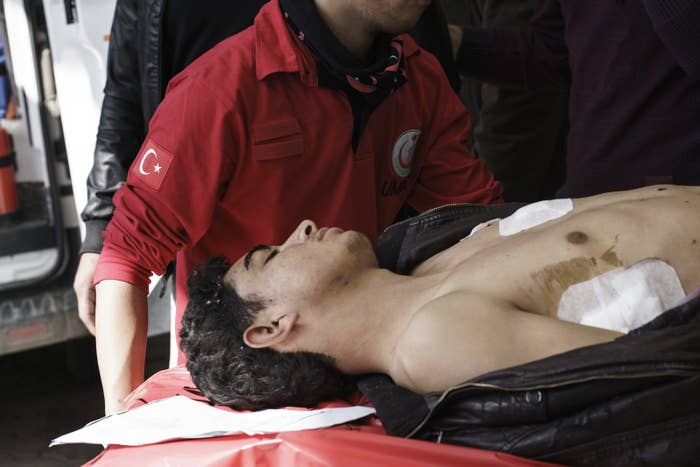
ISTANBUL — Monday marked an “unprecedented” surge in attacks on health facilities in Syria, according to an internal report by affiliates of the World Health Organization that was rushed out to take the toll of the damage.
The report, compiled by the consortium of medical facilities the WHO oversees in the country and provided exclusively to BuzzFeed News, documents a series of what appeared to be targeted bombings of hospitals and other health facilities in Syria. The attacks — which local doctors and international observers alike blamed on Syrian and Russian missiles — killed patients and medical staff at seven different medical sites, the report said, adding that Monday marked “an unprecedented increase in the number of attacks on healthcare in one single day.”
On Monday, BuzzFeed News reported on the carnage at a hospital run by Doctors Without Borders in the town of Marat al-Numan, in the northern province of Idlib, in which patients and staff were killed in staggered strikes that appeared designed to also kill rescue workers responding to the initial casualties. The report found that in addition to Marat al-Numan, six additional medical facilities were hit: two more in Idlib, another two in the nearby province of Aleppo, and two in the southern province of Deraa. All were in areas controlled by the Syrian opposition.
The report called the impact on local health services “staggering.” The facilities had combined for more than 23,000 instances of patient care per month, it said, including more than 1,000 reproductive and health services and 550 deliveries. “Provision of these medical services has been lost with the attacks,” the report said.
Three of the facilities are now out of service permanently, while the other four are temporarily closed.
Taysir Ghalyon, who directs a local aid organization working in the hospital in the town of Azaz, on the Turkish border, said the hospital was hit by a missile at around 9am on Monday. He said at least three civilians were killed and 12 medical staff injured in the attack — and he believed that the intent was making life more difficult for doctors and civilians. “The attacks happened in the morning, and they know that at this time the hospital is full of patients,” Ghalyon said in a phone interview. “The aim is killing of civilians and the displacement of more people. Because medical care is an artery of life, and if it stops pumping, people will have to find another place to live.”
The attacks on medical facilities added to the dire humanitarian situation in northern Syria, which has deteriorated to new lows as the Syrian government and its allies advance on the rebel-held portion of Aleppo, Syria’s largest city. There has been no reported improvement following the proposal for a “cessation of hostilities” that was announced by the U.S. and Russia in Munich last week. “I don’t know how many more times we can say we’re becoming increasingly concerned,” said Christy Delafield, a senior communications officer for Mercy Corps, one of the largest aid providers in northern Syria.
Local medical workers and international NGOs have warned in the past that the government of Syrian president Bashar al-Assad systematically targets hospitals with airstrikes — in violation of international law — in an effort to make opposition-held areas unlivable.
With the Russian military now joining Assad’s military in attacks against rebels, analysts said its strategy was the same. “What appears to be a deliberate strategy by Russia to destroy medical infrastructure in opposition-held areas demonstrates the high degree of strategic alignment between Moscow and Damascus,” said Torbjorn Soltvedt, the head of the Middle East and North Africa at Verisk Maplecroft in London, in an emailed statement. “The attacks on [medical facilities] represent a continuation of the Syrian regime’s tactics.”


